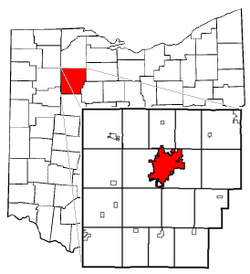Findlay, OH
| Findlay, Ohio | |
|---|---|
| City | |

Aerial view of downtown Findlay
|
|
| Nickname(s): Flag City, USA | |
 Findlay's position within Hancock County (foreground) and Ohio (background) |
|
| Coordinates: 41°2′34″N 83°38′32″W / 41.04278°N 83.64222°WCoordinates: 41°2′34″N 83°38′32″W / 41.04278°N 83.64222°W | |
| Country | United States |
| State | Ohio |
| County | Hancock |
| Government | |
| • Mayor | Lydia Mihalik |
| Area | |
| • Total | 19.25 sq mi (49.86 km2) |
| • Land | 19.13 sq mi (49.55 km2) |
| • Water | 0.12 sq mi (0.31 km2) |
| Elevation | 778 ft (237 m) |
| Population (2010) | |
| • Total | 41,202 |
| • Estimate (2015) | 41,149 |
| • Density | 2,153.8/sq mi (831.6/km2) |
| Time zone | Eastern (EST) (UTC-5) |
| • Summer (DST) | EDT (UTC-4) |
| ZIP codes | 45839-45840 |
| Area code(s) | 419, 567 |
| FIPS code | 39-27048 |
| GNIS feature ID | 1040439 |
| Website |
www.FindlayOhio.com www.FindlayHancockED.com www.VisitFindlay.com |
www.FindlayOhio.com www.FindlayHancockED.com
Findlay is a city in and the county seat of Hancock County, Ohio, United States. The city metro area is often referred as The Greater Findlay Area. Located in northwestern Ohio, Findlay lies approximately 40 miles (64 km) south of Toledo. The population was 41,202 at the 2010 census. It is home to the University of Findlay. Findlay is one of two cities in Hancock County, along with Fostoria. Findlay is the second largest city in Northwest Ohio.
In the War of 1812, Colonel James Findlay of Cincinnati built a road and a stockade to transport and shelter troops in the Great Black Swamp region. This stockade was named Fort Findlay in his honor. At the conclusion of the war, the community of Findlay was born. The first town lots were laid out in 1821 by the future Ohio Governor Joseph Vance and Elnathan Corry.
Early in its history, prior to the Civil War, Findlay was a stop for slaves along the Underground Railroad.
During the 1880s, Findlay was a booming center of oil and natural gas production, though the supply of petroleum had dwindled by the early 20th century.
Findlay hosted the highly competitive Ohio State Music Festival in 1884. A young cornet player, Warren G. Harding, and his Citizens' Cornet Band of Marion placed third in the competition. Harding would go on to be elected the 29th President of the United States.
On March 31, 1892, the only known lynching in the history of Hancock County occurred when a mob of 1,000 men, many "respectable citizens", broke into the county jail in Findlay. They lynched Mr. Lytle, who had fatally injured his wife and two daughters with a hatchet the day before, by hanging him twice (first from the bridge, then a telegraph pole) and finally shooting his body over a dozen times. The authorities had intended to secretly convey the prisoner to a suburb at 1 o'clock, where a train was to have been taken for Lima, but their plans were frustrated by the mob.
...
Wikipedia
